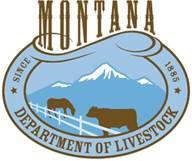First Confirmed Equine Case of West Nile Virus in Montana for 2018
Helena, Mont. – The Montana Department of Livestock has received the first reported cases of equine West Nile Virus in Montana for 2018 in Musselshell and Lake Counties. This follows the detection of the virus in mosquito surveillance pools from Cascade, Hill, and Lewis and Clark Counties. Montana typically sees cases of West Nile Virus through late summer and into fall.
West Nile Virus affects humans, equines, and birds. It is spread through the bites of infected mosquitos; horses cannot transmit the virus directly to people. Detections of the disease in horses and mosquitos in Montana serve as an important reminder for people to take steps to prevent West Nile Virus infection.
“There is no direct treatment for the virus in horses, but vaccination is highly effective in preventing disease. Horses that are vaccinated rarely die or are euthanized because of the disease,” said Dr. Tahnee Szymanski, Assistant State Veterinarian. “Vaccination is typically administered in the spring but may offer some protection even this late in the season. Work with your veterinarian to determine if your horse could still benefit from vaccination.”
Horse owners should be aware of the typical signs of West Nile Virus which include:
- Fever, loss of appetite and depression;
- Incoordination or weakness of the hind limbs;
- Muscle or muzzle twitching, drooling.
In the meantime, topical insecticides and eliminating standing water may help decrease your horse’s exposure to mosquitos. The mosquitos that carry West Nile Virus are most active at dawn and dusk, so consider keeping your horses off of irrigated pastures and away from water sources during those times of the day.
The mission of the DOL is to control and eradicate animal diseases, prevent the transmission of animal diseases to humans, and to protect the livestock industry from theft and predatory animals. For more information on the department, visit www.liv.mt.gov.




